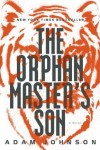Pulitzer Wishes Granted
 The literary world breathed a sigh of relief when it learned today that there would be a Pulitzer Prize for fiction this year. The winner is The Orphan Master’s Son by Adam Johnson (Random House), described in the citation as “an exquisitely crafted novel that carries the reader on an adventuresome journey into the depths of totalitarian North Korea and into the most intimate spaces of the human heart.”
The literary world breathed a sigh of relief when it learned today that there would be a Pulitzer Prize for fiction this year. The winner is The Orphan Master’s Son by Adam Johnson (Random House), described in the citation as “an exquisitely crafted novel that carries the reader on an adventuresome journey into the depths of totalitarian North Korea and into the most intimate spaces of the human heart.”
The finalists are:
What We Talk About When We Talk About Anne Frank by Nathan Englander (RH/Knopf) — “A diverse yet consistently masterful collection of stories that explore Jewish identity and questions of modern life in ways that can both delight and unsettle the reader.”
The Snow Child by Eowyn Ivey (Hachette/Reagan Arthur/Little, Brown) – “An enchanting novel about an older homesteading couple who long for a child amid the hard wilderness of Alaska and a feral girl who emerges from the woods to bring them hope.”
The prizes in the other book awards went to (finalists listed here):
History: Embers of War: The Fall of an Empire and the Making of America’s Vietnam by Fredrik Logevall (Random House) — “a balanced, deeply researched history of how, as French colonial rule faltered, a succession of American leaders moved step by step down a road toward full-blown war.”
Biography: The Black Count: Glory, Revolution, Betrayal, and the Real Count of Monte Cristo by Tom Reiss (RH/Crown) — “a compelling story of a forgotten swashbuckling hero of mixed race whose bold exploits were captured by his son, Alexander Dumas, in famous 19th century novels.”
Non-fiction: Devil in the Grove: Thurgood Marshall, the Groveland Boys, and the Dawn of a New America” by Gilbert King (Harper) – “a richly detailed chronicle of racial injustice in the Florida town of Groveland in 1949, involving four black men falsely accused of rape and drawing a civil rights crusader, and eventual Supreme Court justice, into the legal battle.”
Poetry: Stag’s Leap by Sharon Olds, (RH/Knopf) – “a book of unflinching poems on the author’s divorce that examine love, sorrow and the limits of self-knowledge.”
